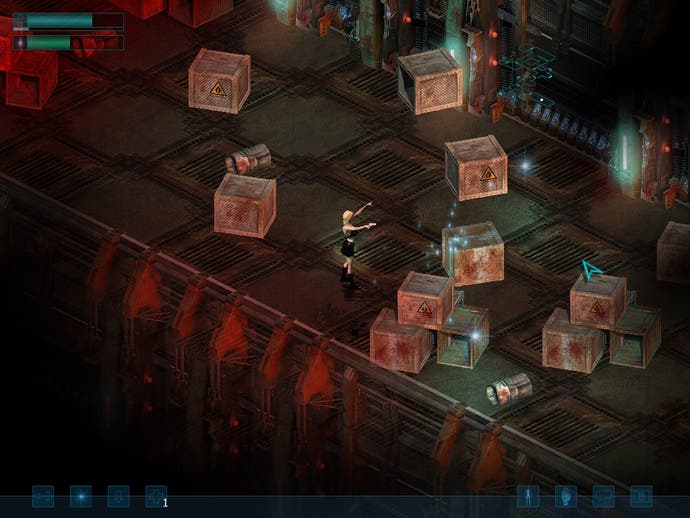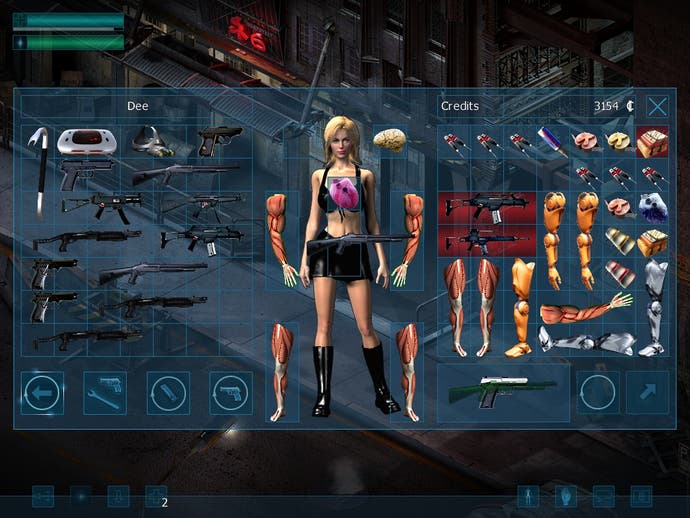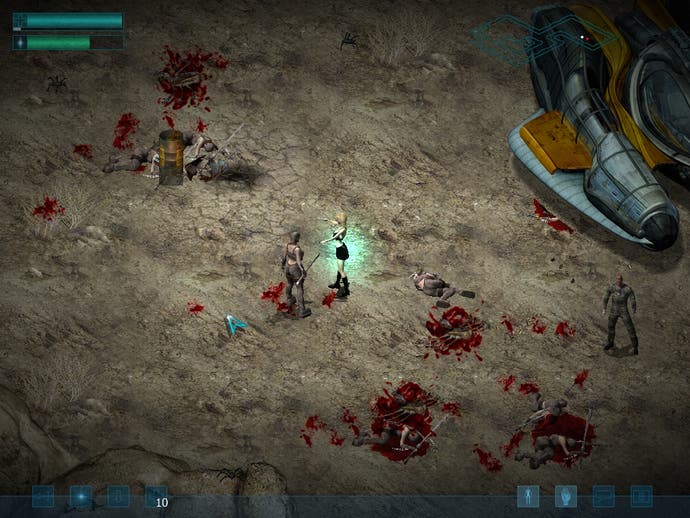Restricted Area
Police Warning: Do not bother to cross.
"Hello misses."
Hello indeed. This glorious legend represents the very first spoken words in RPG-lite Restricted Area, (should you be playing as one of the two available female characters). Typos are not the be-all and end-all of civilisation (that honour goes to incorrectly used apostrophes), but their inclusion is never a good sign. Opening with one - that achieves ‘omen' status.
A quick look at the credits, and a lot of immediate questions are answered. Questions such as, "How does this cyber-punk Diablo clone manage to look and feel quite so much like an average Atari ST title?" and, "How can a development team have made this many mistakes, this poorly?" Flip through the manual and find the credits page, turn over to find where the rest of them must be, turn back confused, and realise that Restricted Area really is the work of just two guys. German developers Master Creating (maybe it makes more sense in German) are Martin Jassing and Jan Beuck, two men, on their own, who've worked really hard to create a commercial videogame. Not a faceless corporate entity toward whom it is easy to direct scorn and criticism, but a couple of regular guys. So we go easy on them, right? It's not fair to measure their game up against the $10 million projects that rival it, surely? Sorry - it doesn't work that way.
We're here to protect you, the gamer, against them, the rubbish games. And as sure as we are that we'd absolutely love Martin and Jan were we to meet them, gladly buying them beer after beer as we talked videogames all evening, when they put their box into the shops alongside all the rest, then they become all the rest. Restricted Area is not a good game, and it's our job to not pretend otherwise.
The four characters available for proceedings are: a Mr Matrix sunglasses type, Johnson; psi-casting boob-vixen, Victoria Williams; Kenji Takahasi, a hopelessly generic Japanese ninja type; and Jessica Parker, super-cute 1337 hax0r with a sidekick drone. So tank, mage, fighter and thief then. Each is pleasingly different from the last, and each has their own pathway through the game's central story. And they really do. The intense number of variables when levelling your single character are revealed in the different options available to each, so which you pick will make a realistic difference to the sort of experience you'll have. While there are going to be plenty of criticisms here, these unique development trees receive a polite nod of approval. See, trouble is, even here it's impossible not to have a dig. According to the manual, "There is a ‘demand level' item in the character descriptions that shows how easy a character is to manage - not to be confused with the degree of difficulty!" Which is why it's especially unnerving to find that this attribute is described in the game's said character descriptions as "Difficulty".

Further proving the variation in this choice, in later levels you'll meet the three you didn't pick, so if you want to experience the whole story, things are given a suggestion of replayability. Trouble is, to get replayability, you really first of all need playability, and it's there that things fall down. Other trouble is, the story's complete rubbish, and you won't even care the first time.
If you've played Diablo, you'll know how masterfully the "Quick! Hit everything! Pick stuff up! Hit more things! Hit those things as well, but harder than the last lot!" school of gaming can be employed. If you've played Dungeon Lords, or any number of other lazy RPG drones, then you'll know how terribly it usually works out. So here is a text-based rendition of us playing Restricted Area:
Left click. Left click. Left click. Left click. Left click. Left click. Left click. Left click. Left click. Left click. Left click. Left click. Left click. Left click. Left click. Left click. Left click. Left click. Left click. Left click. Left click. Left click. Left click. Left click. Left click. Left click. Left click. Left click. Left click. Left click. Left click. Left click. Left click. Left click. Left click. Left click. Left click. Left click. Left click. Left click. Left click. Left click. Left click. Left click. Left click. Left click. Left click. Left click. Middle click.

In fairness, some of those left clicks are running away, others are running toward, and the rest the infinite bullets pumping from our guns into the endlessly repetitive enemy heads. The middle click picks up the drops, which because this is THE FUTURE GODDAMMIT, are not potions and spells and magical hats, but cyber-implants for our FUTURISTIC BODIES. That's THE FUTURE. Got it? Remember: THE FUTURE. And definitely not a fantasy world. So long as this is clear.
Of course, it's a post-apocalyptic future, where everything has been painted rust brown, and although every car is broken and every shop burned down, all the computers seem to be fine, blinking away pointlessly in the background (unless you're playing Parker, when they allow you access to the online world). The chests (chests?) scattered about the floors of these dilapidated buildings contain spare cyber-arms, legs, brains and hearts, that can be augmented to your character's body at any time. Really - any time. That's right - pick up the brain from the rusty floor, and quickly pop it inside your human head, before left clicking for another ten minutes. Perhaps that's why the avatars are so unbelievably bloody stupid.
Pathfinding wasn't invented around the time of the Atari ST, and this unwitting tribute to those years doesn't let itself down here. Not for your character who must be hand-held through every (er) footstep, nor any of the moronic enemies that would attack you were it not for their fetishistic attraction to smashing the scenery's crates, or wedging themselves into doorways and calmly jogging on the spot. This happens with such regularity and reliability that we used it as a common technique during combat.

Missions are played out in dungeons; key ones for the story's progression, and randomly spawned side-quests for finding new augmentations and boosting skill levels along the way. It's here that the only incentive to keep clicking appears - levelling up is frequent and satisfying, letting you occasionally feel like Captain Powerfulpants - but this is transitory, and the ultimate monotony of the endlessly miserable locations quickly pisses out that fire.
It is, in all, a dreadful game. It's probably an astonishing achievement for the work of two guys. But so would be a space-shuttle launch attempt, and we challenge anyone to volunteer for that space program. The story couldn't be more clichéd, the fighting more tiresome, the dialogue more nonsensical, the graphics more primitive, the acting more wooden. It doesn't matter who makes a game; what matters is whether you'll enjoy playing it. And you won't. Not even it a bit.
Goodbye misses.

